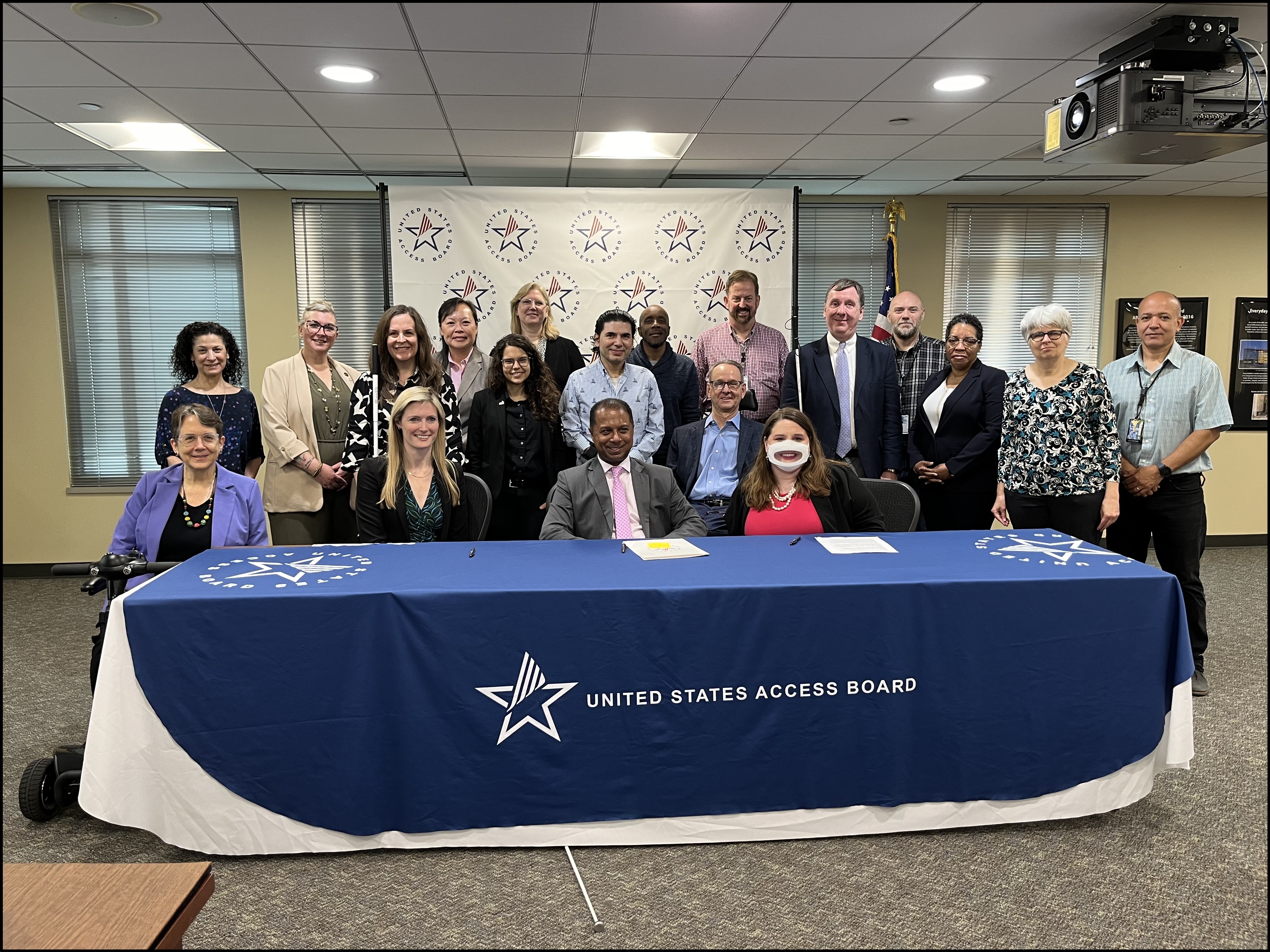U.S. Access Board Holds Signing of Artificial Intelligence Memorandum of Understanding with Disability and Technology Partners
Artificial Intelligence (AI) can increase accessibility, but it can also create barriers for people with disabilities. To address equity and accessibility, the Access Board was tasked with several actions in the Executive Order on the Safe, Secure, and Trustworthy Development and Use of Artificial Intelligence. The U.S. Access Board signed a Memorandum of Understanding (MOU) today, Wednesday, May 15, 2024, with the American Association of People with Disabilities (AAPD) and the Center for Democracy & Technology (CDT) to ensure that the disability community is engaged and supported through education and resources related to AI. The signing took place at the Board’s office in Washington, D.C.

Presidentially appointed Access Board Members and Board staff were present at the signing, along with Sachin Pavithran, Executive Director of the U.S. Access Board, White House Assistant Director for Accessibility, Judy Brewer, Maria Town, President and CEO of the American Association of People with Disabilities and Alexandra Reeve Givens, President & CEO of the Center for Democracy and Technology.
Pavithran welcomed attendees, sharing that “Our goal is to communicate with the disability community to obtain input on equity and access to artificial intelligence (AI), and to connect with technology entities to integrate disability awareness and accessibility needs within mainstream technology conversations, policies, and practices”. He added the significance of this signing as it is “launching the Access Board’s first Memorandum of Understanding with two leading organizations in disability policy. We are now leading the path forward to responsible and accessible AI”.
The American Association of People with Disabilities (AAPD) is a national disability-led and cross-disability rights organization, promoting equal opportunity, economic power, independent living, and political participation for over 60 million Americans with disabilities.
“Working with the Access Board and CDT provides an important and necessary opportunity to ensure people with disabilities benefit from the rapid deployment of AI while also ensuring necessary steps are taken to protect them from the harmful use of these transformative tools” said Maria Town, President and CEO of AAPD. “Disabled people belong at all tables where decisions that will impact us are being made, and this partnership will ensure our community is at the table during this pivotal moment in the federal government’s use of AI. AAPD is excited for the work ahead.”
The Center for Democracy & Technology (CDT) is a nonpartisan, nonprofit organization leading the advancement of civil rights and civil liberties in the digital age. CDT is at the forefront of discussions with policymakers and companies about responsible technology practices and conducts research and public advocacy to ensure artificial intelligence and other technology develops in a manner that is consistent with human rights and democratic values.
“As AI impacts ever more aspects of people’s daily lives, it’s essential to center the unique experiences and needs of people with disabilities” said Alexandra Givens of the Center for Democracy & Technology. “AI systems can shape high-stakes areas like who is hired for a job, the administration of public benefits programs, and important decisions in healthcare. At the same time, there’s tremendous potential for AI to enhance accessibility and create other benefits across society. CDT is proud to partner with the Access Board to help ensure that AI tools are developed and used with a commitment to equity, nondiscrimination, and creating opportunities for all”.
The Memorandum of Understanding
The MOU will ensure that the Access Board collaborates with AAPD and CDT collaborate and implement three key activities within their partnership that include:
- Establishing opportunities that promote solidarity, relationship-building and information sharing across disability and technology communities.
- Identifying and developing possible solutions to potential or existing civil rights concerns, accessibility barriers, and risks of AI.
- Providing information, technical assistance, and access to resources that will enable disability and technology communities to promote and create safe, equitable, and accessible artificial intelligence.
Immediately after the signing of the Memorandum of Understanding, there was a time of celebratory group photos to mark the occasion, which was followed by the kick-off planning meeting between the partners to develop the implementation of their partnership.
A webinar series will be launched this summer to provide more information on AI for the disability community. Be sure to sign up for our email updates to receive the forthcoming details on the webinars and more!
Press inquiries can be directed to Amy Nieves, Public Affairs Specialist at news@access-board.gov.

